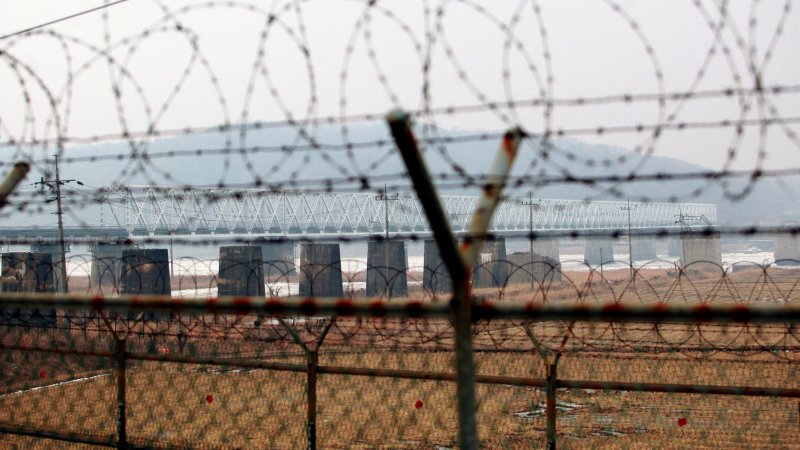Heavy barbed wire fences guard the Freedom Bridge, connecting South Korea to the Demilitarized Zone (DMZ) and North Korea, near Seoul on January 29, 2013. The Freedom Bridge Bridge, one of the few ways in or out of North Korea, allowed South Korean and American POWs to cross from North Korea to freedom. UPI/Stephen Shaver |
License Photo
PYONGYANG, North Korea, Feb. 12 (UPI) -- North Korea claimed it safely tested its third nuclear device underground Tuesday, drawing condemnation from the U.N. Security Council.
All 15 members of the council, including China, North Korea's traditional ally, strongly condemned the test in a statement.
"In line with this commitment and the gravity of this violation, the members of the Security Council will begin work immediately on appropriate measures in a Security Council resolution," Kim Sung-hwan, South Korea's foreign minister, said in a statement to the media posted on the council's website. South Korea holds the rotating presidency of the Council for February.
Hours after seismic activity was detected at the North's Punggye-ri nuclear test complex, North Korea's Central News Agency said the detonation used a more compact nuclear device compared to its two earlier nuclear tests and was conducted in a safe manner, Yonhap News Agency reported.
"The test was conducted in a safe and perfect way on a high level with the use of a smaller and light A-bomb unlike the previous ones, yet with great explosive power," KCNA said in the English translation. "The specific features of the function and explosive power of the A-bomb and all other measurements fully tallied with the values of the design, physically demonstrating the good performance of the [North Korean] nuclear deterrence that has become diversified."
After it was confirmed, South Korea said in a statement the nuclear test violated U.N. Security Council resolutions.
The nuclear test "is an unacceptable threat to peace and security on the Korean Peninsula and in the region and a head-on challenge to the international community," the statement said. "North Korea won't be able to avoid grave responsibility."
U.S. President Obama called the test a "highly provocative act" that violates the country's obligations under "numerous" U.N. Security Council resolutions, is contrary to its commitment to the so-called Six Party Talks and increases the risk of proliferation.
"North Korea's nuclear weapons and ballistic missile programs constitute a threat to U.S. national security and to international peace and security," Obama said in a statement. "The United States remains vigilant in the face of North Korean provocations and steadfast in our defense commitments to allies in the region."
Later, in his State of the Union address, Obama admonished North Korea again, saying the country "will only achieve security and prosperity by meeting their international obligations. Provocations of the sort we saw last night will only isolate them further, as we stand by our allies, strengthen our own missile defense, and lead the world in taking firm action in response to these threats."
A spokesman for Kim said South Korea has also been in "close consultations" with China.
The U.S. Geological Survey said seismic activity measured 4.9 on the Richter scale and was about 0.6 mile deep, suggesting a light earthquake; however, it was detected in an area where earthquakes are virtually unknown, CNN said.
"It's a nuclear test," Jeffrey Lewis, director of the East Asia Non-proliferation Program at the Monterey Institute of International Studies in California, said. "That magnitude and that location -- it's awfully unlikely it's anything else."
The commission for the Comprehensive Nuclear Test Ban Treaty in Vienna said the seismic activity had "clear explosion-like characteristics," The New York Times reported. Experts told the newspaper the explosion appeared to be less powerful than the bomb the United States dropped on Hiroshima, Japan, during World War II but significantly more powerful than the devices in North Korea's previous tests.
KCNA said the test was in response to the condemnation it received after launching a long-range Unha-3 rocket Dec. 12. North Korean officials said the international backlash was tantamount to encroaching on the country's sovereignty. KCNA said the test would boost the country's defense against security threats from abroad, and help ensure peace and stability on the Korean Peninsula and in the surrounding region.















